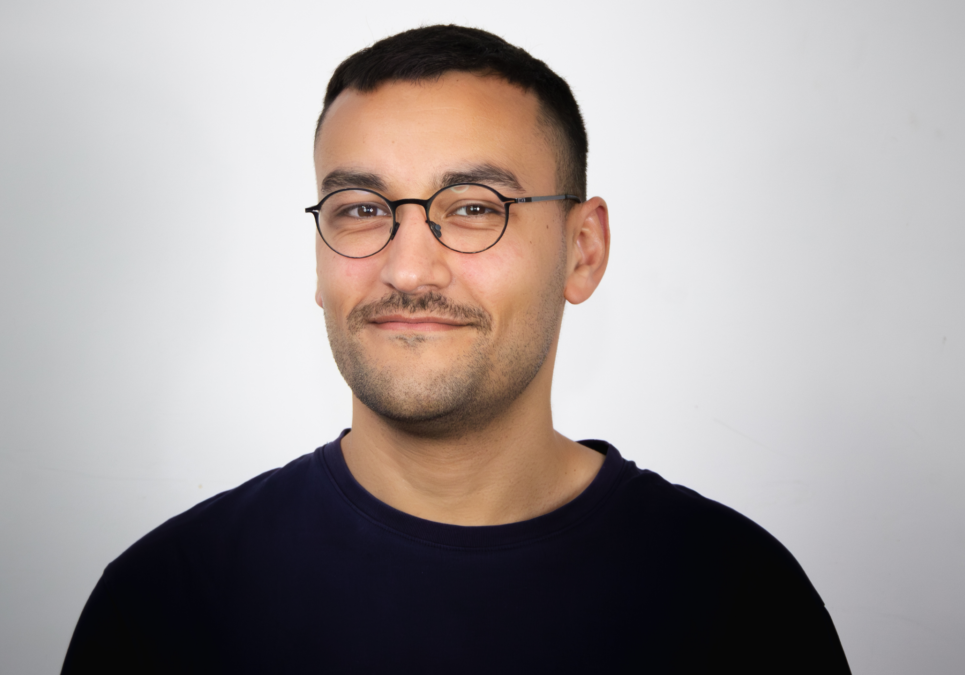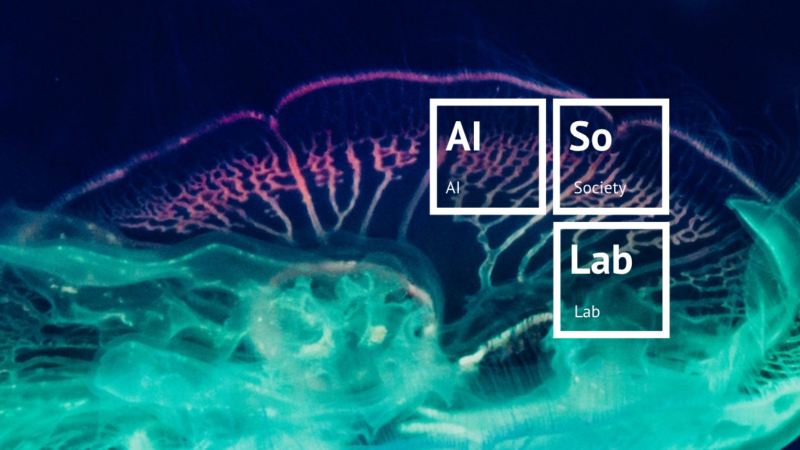Sami Nenno
Sami Nenno ist assoziierter Forscher im AI & Society Lab am Alexander von Humboldt Institut für Internet und Gesellschaft (HIIG) und Postdoc am Center Synergy of Systems (Synosys) der Technischen Universität Dresden. Seine Dissertation beschäftigte sich mit der Automatisierung von journalistischen Prozessen. In diesem Rahmen entwickelte er ein Natural Language Tool, das Faktenchecker*innen beim Monitoring von Desinformation unterstützt. Thematisch forscht Sami zu Desinformation und politischer Kommunikation in den (sozialen) Medien. Daneben beschäftigt er sich mit der Weiterentwicklung automatisierter Methoden zur Analyse großer Textdatensätze. Damit zusammenhängend forschte er auch zur Nachhaltigkeit und Effizienz von Machine Learning Modellen.
Sami wurde an der Universität Bremen in Kommunikationswissenschaft promoviert. An der Humboldt Universität Berlin machte er einen Master in Philosophie und schloss an der Berliner Hochschule für Technik einen Master in Data Science ab.
 Gesellschaft & Kultur · KI
Gesellschaft & Kultur · KIPublic Interest AI
Die Forschungsgruppe „Public Interest AI“ entwickelt ein operationalisierbares Analyseverfahren, das es ermöglicht, Gemeinwohlorientierung zu definieren und auf drei Ebenen zu beurteilen.
Zeitschriftenartikel und Konferenzbeiträge
Nenno, S., & Puschmann, C. (2025). All The (Fake) News That’s Fit to Share? News Values in Perceived Misinformation across Twenty-Four Countries. The International Journal of Press/Politics. DOI: https://doi.org/10.1177/19401612241311893 Weitere Informationen
Nenno, S. (2025). Fact-checks as Data Source? Content Analysis of Fact-checking Articles in Germany between 2019 and 2023. Computational Communication Research, 7(1), 1. DOI: https://doi.org/10.5117/CCR2025.1.6.NENN Weitere Informationen
Nenno, S. (2024). Is checkworthiness generalizable? Evaluating task and domain generalization of datasets for claim detection. Neural Computing & Applications, 36, 15165–15176. DOI: 10.1007/s00521-024-09896-4 Weitere Informationen
Nenno, S. (2024). Potentials and Limitations of Active Learning for the Reduction of Energy Consumption during Model Training. Weizenbaum Journal of the Digital Society, 4(1). DOI: 10.34669/WI.WJDS/4.1.3 Weitere Informationen
Nenno, S. (2024). Propositional claim detection: A task and dataset for the classification of claims to truth. Journal of Computational Social Science. DOI: 10.1007/s42001-024-00289-0 Weitere Informationen
Nenno, S. (2024). Bootstrapping public entities. Domain-specific NER for public speakers. Communication Methods and Measures. DOI: 10.1080/19312458.2024.2388098 Weitere Informationen
Arbeitspapiere
Züger, T., Faßbender, J., Kuper, F., Nenno, S., Katzy-Reinshagen, A., & Kühnlein, I. (2022). Civic Coding: Grundlagen und empirische Einblicke zur Unterstützung gemeinwohlorientierter KI. Civic Coding Initiative. Weitere Informationen
Andere Publikationen
Nenno, S. (2024). Schädliche Informationen im Netz: Wann der Hype um Desinformation schadet. Tagesspiegel. Weitere Informationen
Nenno, S., Theodorakopulous, D., Lebedjew, I., Metz A. (2024). Wie nachhaltig sind KI-Systeme?, Podcast: Mission Energiewende. Weitere Informationen
Nenno, S. (2024). What’s the Content of Fact-checks and Misinformation in Germany? Elephant in the Lab. Weitere Informationen
Nenno, S. (2023). Propositional Claim Detection, (NLP Datensatz). Data File Version 1.0.0, https://doi.org/10.7802/2538. Weitere Informationen
Nenno, S. (2023). Inside Hugging Face. Digital society blog. Weitere Informationen
Nenno, S. (2023). Wie können KI-Modelle energiesparender werden? Ein Überblick über aktuelle Trends. te.ma. Weitere Informationen
Nenno, S., & Richter, C. (2022). Sustainable AI – How environmentally friendly is AI really? Digital society blog. Weitere Informationen
Nenno, S. (2021). Siri’s evil sister. When the Dutch public service steals your data. Digital society blog. Weitere Informationen
Hewett, F., & Nenno, S. (2021). How to identify bias in Natural Language Processing. Digital society blog. Weitere Informationen
Nenno, S. (2021). How to find the right survey tool:problems and proposals. Elephant in the Lab. Weitere Informationen
Vorträge
All the (fake) news that’s fit to share? News values in perceived misinformation across 24 countriesECREA 2024 Communication & social (dis)order: 10th European Communication Conference (Session: From sharing to discussing: Online media experiences). European Communication Research and Education Association (ECREA). University of Ljubljana, Ljubljana, Slovenia: 25.09.2024 Weitere Informationen
Sami Nenno, Cornelius Puschmann
Mechanistic Interpretability of Socio-Political Frames in Language Models: an ExplorationAdvances in Interpretable Machine Learning and Artificial Intelligence (AIMLAI). INRIA. Radisson Blu Vilnius Hotel, Vilnius, Lithuania: 09.09.2024 Weitere Informationen
Hadi Asghari, Sami Nenno
Random Evidence. Study on the Types of Evidence used to debunk Misinformation and the Implications for Automated Fact-checkingMisdoom 2024: 6th Multidisciplinary International Symposium on Disinformation in Open Online Media. University of Münster. Münster Palace, Münster, Germany: 03.09.2024 Weitere Informationen
Sami Nenno
Fact-checks as Data Source? Content Analysis of Fact-checking Articles in Germany between 2019 and 2023Ringvorlesung: "Politische Kommunikation". Friedrich-Schiller-Universität Jena. Institut für Kommunikationswissenschaft, Jena, Germany: 29.05.2024 Weitere Informationen
Sami Nenno
Implementation of Public Interest AIBARC Data Festival. BARC GmbH. Muffatwerk Munich, Munich, Germany: 19.03.2024 Weitere Informationen
Sami Nenno
Implementation of Public Interest AIDATA festival #Munich: Getting real with AI. BARC. Muffatwerk Munich, Munich, Germany: 19.03.2024 Weitere Informationen
Sami Nenno
Desinformation und KI. Wird jetzt alles noch schlimmer?Lecture: Desinformation und KI. Wird jetzt alles noch schlimmer?. Modus – Zentrum für angewandte Deradikalisierungsforschung gGmbH. Modus – Zentrum für angewandte Deradikalisierungsforschung, Berlin, Germany: 12.12.2023
Sami Nenno
KI 2023 – 46th German Conference on Artificial Intelligence (Session: AI Systems for the Public Interest). Gesellschaft für Informatik (GI). Hochschule für Technik und Wirtschaft Berlin, Berlin, Germany: 26.09.2023 Weitere InformationenJudith Faßbender, Freya Hewett, Sami Nenno
Propositional Claim DetectionInternational Conference for Computational Social Science IC2S2'23 Copenhagen. International Society for Computational Social Science (ISCSS). Mærsk Tower of the University of Copenhagen, Copenhagen, Denmark: 20.07.2023 Weitere Informationen
Sami Nenno
Eine Bestandsaufnahme des CO2-Fußabdrucks von AI: Was wissen wir und wie können wir ihn verringern?KI Camp 2023. Gesellschaft für Informatik. Factory Berlin Görlitzer Park, Berlin, Germany: 26.04.2023 Weitere Informationen
Sami Nenno, Hadi Asghari
AI for Sustainability & Sustainable AICIFE Master programmes in Global Economic Governance & Public Affairs (GEGPA) and EU Trade & Climate Diplomacy (EUDIPLO). Centre International de Formation Européenne (CIFE). Centre International de Formation Européenne (CIFE), Berlin, Germany: 17.03.2023
Asghari, H., Nenno, S.
Panels
Fool Me Twice, Shame On Me: Aggregated Behavior and Clustering of Harmful Actors in Climate Change Online DiscoursesMISDOOM 2024: 6th Multidisciplinary International Symposium on Disinformation in Open Online Media. University of Münster. Münster Palace, Münster, Germany: 03.09.2024 Weitere Informationen
Philip Kessling, Felix Victor Münch, Mattes Ruckdeschel, Gregor Wiedemann, Sami Nenno, Cornelius Puschmann
Moderation von Workshops und Panels
Impuls: Chancen und Gefahren von KI in Bezug auf DesinformationDesinformation, Fake News und Co. – Meinungs- und Demokratiebildung im Schulkontext. Vodafone Stiftung, Hertie School Executive Education. Hertie School, Berlin, Germany: 17.05.2024 Weitere Informationen
Sami Nenno
Was sind Desinformationsnarrative in Deutschland und wie geht man dagegen vor?Mit Menschenrechten Brücken bauen – Politische Bildung in Transformationsprozessen. Deutsches Institut für Menschenrechte. Online, Berlin, Germany: 29.02.2024 Weitere Informationen
Sami Nenno
Organisation von Veranstaltungen
Lange Nacht der Wissenschaft22.06.2024. Humboldt Institute for Internet and Society, Berlin, Germany (National) Weitere Informationen
Philipp Mahlow, Birte Lübbert, Maurice Stenzel, Alina Kontareva, Daniel Pothmann, Nele Buß, Irina Kühnlein, Sarah Spitz, Freia Kuper, Sami Nenno, Freya Hewett, Frederik Efferenn, Georg von Richthofen, Sonja Köhne, Bronwen Deacon, Matthias C. Kettemann, Thomas Christian Bächle, Nataliia Sokolovska, Martin Wrobel, Jörg Pohle, Jeanette Hofmann, Hendrik Send, Theresa Züger
Interaktiver Workshop: KI menschlich erklärt27.09.2023. Humboldt Institute for Internet and Society, Berlin, Germany (National) Weitere Informationen
Daniel Pothmann, Sarah Spitz, Sami Nenno, Frederik Efferenn, Theresa Züger
Hackathon. Entwicklung von KI-ErklärungsmodellenFrom 03.02.2023 to 03.02.2023. Humboldt Institute for Internet and Society, Berlin, Germany. Co-Organised by: neuland & gestalten (National) Weitere Informationen
Daniel Pothmann, Sarah Spitz, Hadi Asghari, Sami Nenno, Freya Hewett, Judith Faßbender, Theresa Züger
Sustainable AI IIwith attending Vip: Lynn Kaack. 14.06.2022. Humboldt Institute for Internet and Society, Berlin, Germany (National)
Sami Nenno, Theresa Züger
AI and the Public Interest13.06.2022. Humboldt Institute for Internet and Society, Berlin, Germany (International) Weitere Informationen
Hadi Asghari, Sami Nenno, Freya Hewett, Judith Faßbender, Theresa Züger
AI & Society Lab (AI & Society Lab)Study week of the ZHAW: "Der Mensch im digitalen Zeitalter". 05.05.2022. Humboldt Institute for Internet and Society, Berlin, Germany. Co-Organised by: ZHAW (International)
Sami Nenno, Judith Faßbender, Theresa Züger
Sustainable AIwith attending Vip: Friederike Rohde. 29.04.2022. Humboldt Institute for Internet and Society, Berlin, Germany (National)
Sami Nenno, Theresa Züger
Teilnahme als ExpertIn
KI-Roundtable: KI und Desinformation Bundesministerium für Digitales und Verkehr. Bundesministerium für Digitales und Verkehr, Berlin, Germany: 24.05.2024Theresa Züger, Sami Nenno
Medienauftritte
Elon Musk wants the far right AfD to win the German election - here’s how he became their champion (24.02.2025). The Independent
Weitere Informationen
How Elon Musk used X to amplify Germany’s far right ahead of election (20.02.2025). Washington Post
Weitere Informationen
Tausende demonstrieren friedlich gegen AfD – X sieht nur „Terroristen“ (05.02.2025). Frankfurter Rundschau
Weitere Informationen
Vor den US-Präsidentschaftswahlen: Wie sollten Medien mit Desinformation und Fake News umgehen? (01.11.2024). Deutschlandfunk – Nach Redaktionsschluss
Weitere Informationen
Wie nachhaltig sind KI-Systeme? - Mission Energiewende | KI und Nachhaltigkeit (14.05.2024). detektor.fm
Weitere Informationen
KI zum Klonen von Stimmen: Künstliche Stimmen, ganz natürlich (06.04.2024). taz
Weitere Informationen
Schädliche Informationen im Netz: Wann der Hype um Desinformation schadet (21.03.2024). Tagesspiegel
Weitere Informationen

